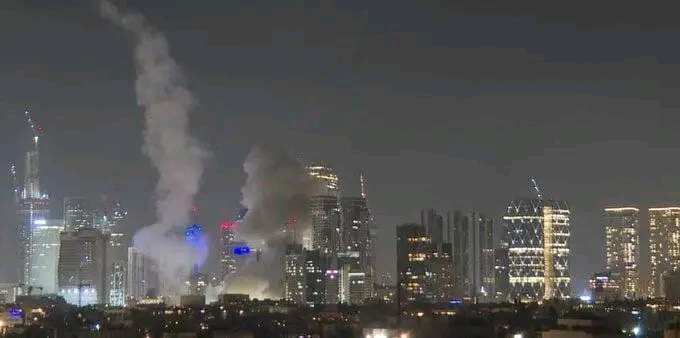Tensions in the Middle East have reached new heights after Israel launched coordinated airstrikes on Iran early Friday, killing several top Iranian military leaders, including General Mohammad Bagheri, Iran’s Chief of Defence Staff, and Islamic Revolutionary Guard Corps Commander Hossein Salami.
In swift retaliation, Iran fired hundreds of ballistic missiles at Israel, injuring at least seven people. The Israeli military described the barrage as a massive, nationwide assault, with Tehran declaring it the start of its “crushing response” to what it called a “savage attack” by Israel.
The escalation prompted multiple countries—Israel, Iran, Iraq, Syria, and Jordan—to close their airspace. Several international airlines suspended or diverted flights over the region due to safety concerns.
Operation Rising Lion
Israeli Prime Minister Benjamin Netanyahu confirmed that the airstrikes, dubbed Operation Rising Lion, targeted Iran’s nuclear sites, missile infrastructure, and senior figures in its weapons program. He defended the operation as a necessary action to safeguard Israeli security.
“This operation struck at the core of Iran’s nuclear and missile programme,” Netanyahu said.
In response to potential global backlash and security threats, Israel temporarily closed its embassies worldwide and urged its citizens abroad to avoid revealing their nationality or travel plans.
Global Reactions
The strikes have sparked urgent diplomatic appeals for de-escalation.
UN Secretary-General António Guterres warned of a “descent into deeper conflict,” calling on both sides to show “maximum restraint.”
U.S. President Donald Trump, who was reportedly briefed before the operation, affirmed continued support for Israel while expressing hope that Iran would return to negotiations.
“Iran must not have a nuclear bomb. But we also want peace,” Trump said.
UK Prime Minister Keir Starmer urged all parties to avoid further escalation, stating, “Escalation serves no one.”
Russia condemned the Israeli strikes, with President Vladimir Putin’s spokesman calling them “unacceptable,” and the Russian Embassy in Tel Aviv advised its citizens to leave Israel immediately.
China issued a stern warning against continued aggression, citing the risk of “severe consequences,” while French President Emmanuel Macron called for “maximum restraint,” supporting Israel’s right to self-defense but warning against destabilizing the region.
Turkey’s President Recep Tayyip Erdogan harshly criticized the Israeli offensive, accusing Netanyahu of violating international law, saying, “The world must stop this lawlessness that threatens global peace.”
Lebanese President Joseph Aoun and Hezbollah, Iran’s key ally in Lebanon, also denounced the strikes, calling them “brutal aggression.”
Rising Regional Tensions
This latest round of hostilities follows months of rising tension that began after the Hamas-led attack on Israel on October 7, 2023. That incident triggered broader regional instability, drawing in Iranian-backed groups such as Hezbollah in Lebanon and Houthi rebels in Yemen.
With fears of a wider regional war mounting, world powers are scrambling to contain the crisis and prevent a full-scale conflict across the Middle East.

